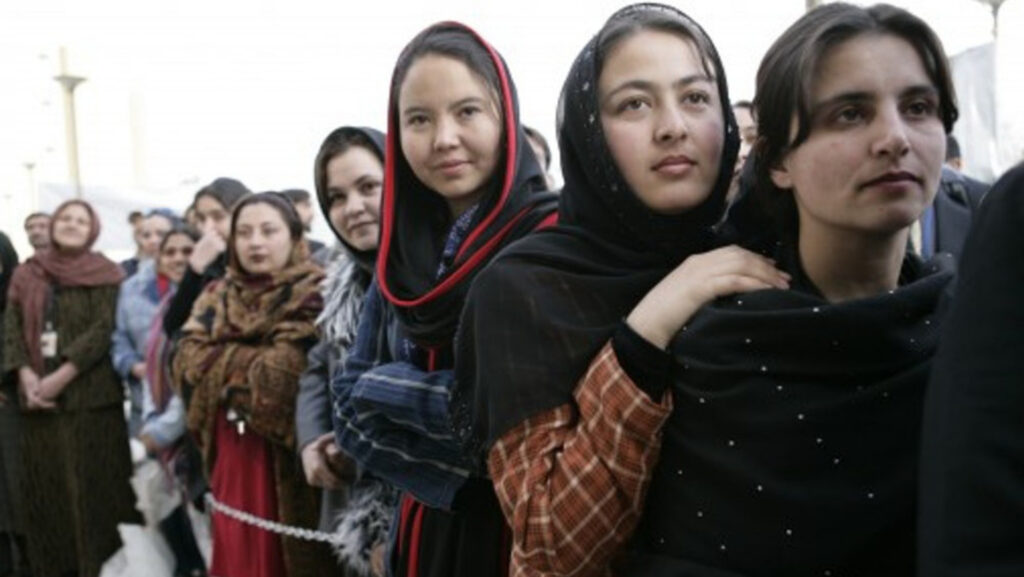Manas Dasgupta
NEW DELHI, May 7: Slowly going back to its true self, the Taliban rulers of Afghanistan are further tightening its noose around women’s liberty issuing a new order on Saturday asking all Afghan women to compulsorily wear head-to-toe clothing (in short Burqa) in public failing which the defaulter’s father or a close male relative will be punished. In a sharp hard-line pivot that confirmed the worst fears of rights activists and was bound to further complicate Taliban dealings with an already distrustful international community, the decree, which calls for women to only show their eyes and recommends they wear the head-to-toe burqa, evoked similar restrictions on women during the Taliban’s previous rule between 1996 and 2001.
“We want our sisters to live with dignity and safety,” said Khalid Hanafi, acting minister for the Taliban’s vice and virtue ministry. “For all dignified Afghan women wearing Hijab is necessary and the best Hijab is chadori (the head-to-toe burqa) which is part of our tradition and is respectful,” he said. “Those women who are not too old or young must cover their face, except the eyes,” he added.
The decree added that if women had no important work outside it is better for them to stay at home. “Islamic principles and Islamic ideology are more important to us than anything else,” Hanafi said.
A spokesman for the Ministry for the Propagation of Virtue and the Prevention of Vice read the decree from the group’s supreme leader Hibatullah Akhundzada at a press conference in Kabul, said a woman’s father or closest male relative would be visited and eventually imprisoned or fired from government jobs if she did not cover her face outside the home.
They added the ideal face covering was the all-encompassing blue burqa, which became a global symbol of the Taliban’s previous hardline regime from 1996 until 2001. Most women in Afghanistan wear a headscarf for religious reasons but many in urban areas such as Kabul do not cover their faces.
The Taliban apparently is slowly escalating its growing restrictions on women in public that is drawing a backlash from the international community and many Afghans. The group has faced intense pushback led by Western governments but joined by some religious scholars and Islamic countries for their growing limits on women’s rights.
A surprise U-turn in March in which the Taliban shut down the high schools for girls the day they were scheduled to reopen since the Taliban takeover in August, last year, reneging on an earlier promise and opting to appease their hard-line base at the expense of further alienating the international community.
That decision disrupted efforts by the Taliban to win recognition from potential international donors at a time when the country was mired in a worsening humanitarian crisis. The move drew the ire of the international community and prompted the United States to cancel planned meetings on easing the country’s financial crisis.
Washington and other nations have cut development aid and enforced strict sanctions on the banking system, since the Taliban took over in August, pushing the country towards economic ruin.
After taking over the reins of the country, the Taliban has claimed that it had changed since it last ruled when it banned girls’ education or women leaving the house without a male relative and women were required to wear cover their faces. However, in recent months the administration has increased its restrictions on women including rules limiting their travel without a male chaperone and banning men and women from visiting parks at the same time, slowly re-introducing all the restrictions it had imposed on women during the Taliban 1 rule.
The Taliban were ousted in 2001 by a U.S.-led coalition for harbouring al-Qaida leader Osama bin Laden and returned to power after America’s chaotic departure last year. Since taking power last August, the Taliban leadership has been squabbling among themselves as they struggle to transition from war to governing. It has pit hard-liners against the more pragmatic among them.
Infuriating many Afghans is the knowledge that many of the Taliban of the younger generation, like Sirajuddin Haqqani, are educating their girls in Pakistan, while in Afghanistan women and girls have been targeted by their repressive edicts since taking power.
Girls have been banned from school beyond grade 6 in most of the country since the Taliban’s return. Universities opened earlier this year in much of the country, but since taking power the Taliban edicts have been erratic. While a handful of provinces continued to provide education to all, most provinces closed educational institutions for girls and women.
The religiously driven Taliban administration fears that going forward with enrolling girls beyond the sixth grade could alienate their rural base, Hashmi said. In the capital of Kabul private schools and universities have operated uninterrupted.

